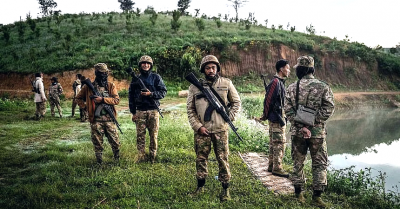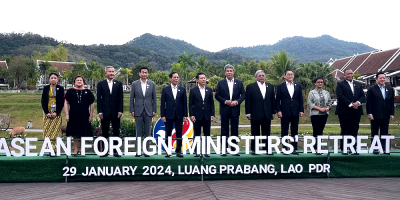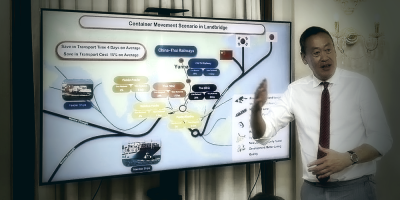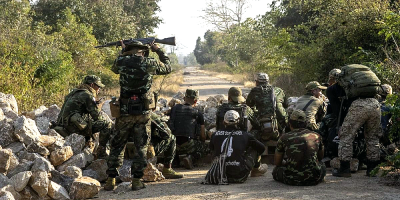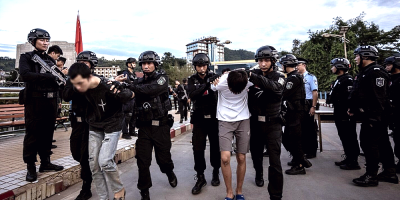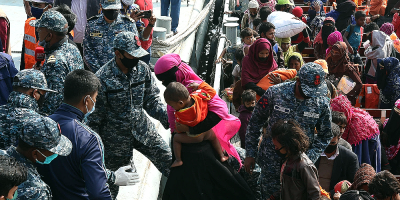
Growing fait accompli by the military administration
More than a year has passed since, following the coup in February 2021, ASEAN leaders met with State Administrative Council Chairman Min Aung Hlaing (Commander-in-Chief of Defense Services) and agreed on the “Five-Point Consensus” in late April of the same year.
A special envoy of the ASEAN Chair was finally able to visit Myanmar in March 2022, but no aspect of the “Five-Point Consensus” has been implemented so far, as the envoy was not able to meet any pro-democracy groups for example.
Amid these circumstances, the Russian invasion of Ukraine in late February 2022 has proved favorable for Myanmar’s military administration.
It is able to evade the eyes of the international community during this time, allowing it to advance the military’s fait accompli and put in place an election system that will enable a puppet party of the military to win.
It is likely planning to make a grand announcement of a “transfer of power to a civil government” by holding elections scheduled for August 2023.
Some countries ready to allow Myanmar’s participation in RCEP
With ASEAN mediation diplomacy going nowhere and time just passing, there is a growing sense in ASEAN that “Myanmar’s military administration has to be de facto recognized.”
Some countries are stating that they will allow Myanmar to participate in the Regional Comprehensive Economic Partnership (RCEP) Agreement, which entered into force in January 2022.
Myanmar’s military administration reported at an ASEAN Economic Ministers Meeting in 2021 that it had completed the deposition of the RCEP ratification instrument by mid-year and had concluded the enforcement procedures.
However, it appears that ASEAN was putting the deposition on hold because of worries that if the ASEAN Secretariat formally accepts the ratification instrument, it might be interpreted as ASEAN recognizing Myanmar’s military administration as “the formal government.”
Yet this situation is changing. According to people in the know, differences in opinion about Myanmar’s participation in RCEP among the signatories are surfacing, so much so that the situation is getting out of hand.
Some signatories have argued that Myanmar should be allowed to join RCEP on the grounds that economics is separate from politics, a position that won the support of several other countries.
Meanwhile, other countries that prioritize democratic values staunchly opposed the military administration’s participation in RCEP.
These diametrically opposed views made it difficult for all countries to respond in unison. Singapore enforced RCEP with Myanmar on March 4, 2022.
Thailand followed suit. Thailand added Myanmar to its list of preferential tariff countries under the RCEP agreement on March 21, 2022, subsequently applying this retroactively to January 1, 2022.
In China, on April 27, 2022, the Customs Tariff Commission of the State Council announced that RCEP tariffs will be applied to imports from Myanmar from May 1.
Most other signatories argue that “RCEP should act in unison.”
In reality, one factor might be that if the signatories make individual decisions about Myanmar’s participation in RCEP, it is possible that operational issues will arise, for example when applying the “cumulative rules” on added value, which may be considered an RCEP feature.
Malaysia’s independent call to ‘wait’
At a time when there is a growing tendency to de facto recognize Myanmar under military administration, Malaysia has been exceptional in independently saying “Wait!”
Foreign Minister Saifuddin Abdullah spoke at the ASEAN Foreign Ministers Meeting on May 5, saying “it won’t be possible to mediate the conflict if we have talks with the military only” and explained the need to establish informal relations with the National Unity Government of Myanmar (NUG), which is Myanmar’s shadow government.
Malaysia has taken more action. Alongside the US-ASEAN Special Summit held in Washington DC in mid-May, Foreign Minister Saifuddin met directly with Zin Mar Aung, Minister of Foreign Affairs of NUG.
While most ASEAN members keep silent about connections and talks with NUG so as not to provoke the military administration, the Malaysian foreign minister deliberately posted a photo of the meeting on social media.
If the power base of Myanmar’s military administration continues to solidify and no progress is made with regard to the “Five-Point Consensus,” talk about the “limitations of ASEAN” will resurface and “loss of centripetal powers” within ASEAN will be unavoidable.
ASEAN has previously acted in unison, but the call to “Wait!” from Malaysia, which can also be seen as grandstanding, is an expression of a sense of crisis about ASEAN.
(Seiya Sukegawa, Visiting Professor, Thai-Nichi Institute of Technology and Professor at Kokushikan University, Japan.)
ADVERTISEMENT
ADVERTISEMENT






